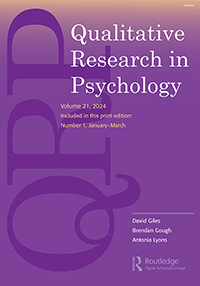因为“成年人并不总是正确的”:在研究中与儿童结盟——从研究问题到作者
IF 4.4
3区 心理学
Q1 PSYCHOLOGY, MULTIDISCIPLINARY
引用次数: 6
摘要
摘要本研究在从提出研究问题到撰写作者的整个研究过程中,让儿童成为研究的盟友。我们的方法通过制定一种调查形式,邀请儿童对成人知识和权威进行批评,从而承认儿童根据《联合国儿童权利公约》享有的参与权。该项目完全是与儿童共同构建的,由成年人指导他们进行规划、分析和创作。我们讨论了我们对Allyship儿童生活经历本身的反思,儿童在焦点小组和访谈中提出的问题阐明了这种方法论方法。我们得出的结论是,孩子们看到并接受了成年人的失败,并寻求为社会世界做出贡献,这些优先事项已经在他们对这个项目的生活经历中得到了体现。我们的方法为在质性心理学和儿童研究领域进一步努力与儿童建立联系提供了一个平台。词语;146本文章由计算机程序翻译,如有差异,请以英文原文为准。
Because ‘grown-ups don’t always get it right’: Allyship with children in research – from research question to authorship
ABSTRACT This study engaged children as research allies throughout the research process from developing research questions to authorship. Our approach recognises children’s right to participation under the United Nations Convention on the Rights of the Child by developing a form of inquiry that invited children’s critique of adult knowledge and authority. The project was fully co-constructed with children, with adults who guided them through planning, analysis and authorship. We discuss our reflections on the children’s lived experience of Allyship itself, with the issues raised by children in focus groups and interviews illuminating this methodological approach. We conclude that children see and accept adult failings and seek to contribute to social worlds, and that these priorities have been enacted in their lived experience of this project. Our approach provides a platform for further endeavours in Allyship with children in the fields of qualitative psychology and childhood studies. Words; 146
求助全文
通过发布文献求助,成功后即可免费获取论文全文。
去求助
来源期刊

Qualitative Research in Psychology
PSYCHOLOGY, MULTIDISCIPLINARY-
CiteScore
20.00
自引率
0.50%
发文量
14
期刊介绍:
Qualitative Research in Psychology is an international, peer-reviewed journal that publishes high-quality, original research. It aims to become the primary forum for qualitative researchers in all areas of psychology, including cognitive, social, developmental, educational, clinical, health, and forensic psychology. The journal also welcomes psychologically relevant qualitative research from other disciplines. It seeks innovative and pioneering work that advances the field of qualitative research in psychology.
The journal has published state-of-the-art debates on various research approaches, methods, and analytic techniques, such as discourse analysis, interpretative phenomenological analysis, visual analyses, and online research. It has also explored the role of qualitative research in fields like psychosocial studies and feminist psychology. Additionally, the journal has provided informative articles on ethics, transcription, interviewee recruitment, and has introduced innovative research techniques like photovoice, autoethnography, template analysis, and psychogeography.
While the predominant audience consists of psychology professionals using qualitative research methods in academic, clinical, or occupational settings, the journal has an interdisciplinary focus. It aims to raise awareness of psychology as a social science that encompasses various qualitative approaches.
In summary, Qualitative Research in Psychology is a leading forum for qualitative researchers in psychology. It publishes cutting-edge research, explores different research approaches and techniques, and encourages interdisciplinary collaboration.
 求助内容:
求助内容: 应助结果提醒方式:
应助结果提醒方式:


